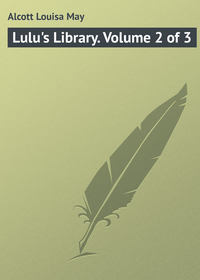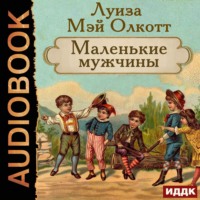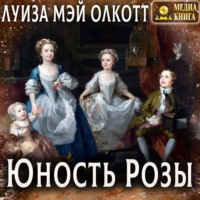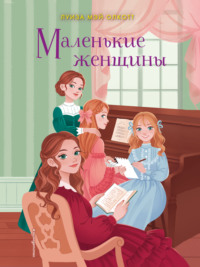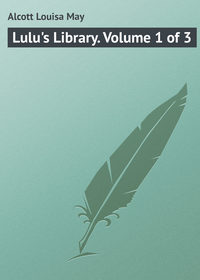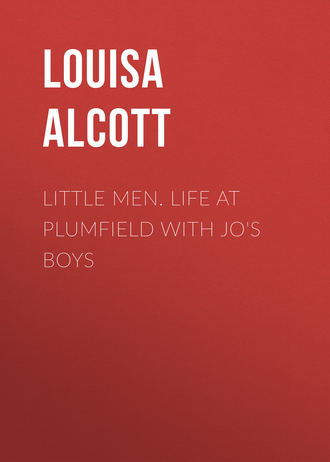 полная версия
полная версияLittle Men. Life at Plumfield with Jo's Boys
“You’ll have to eat them if no one comes for us,” said Nan, who felt like contradicting every thing just then. “If we stay here a great many days, we shall eat up all the berries in the field, and then we shall starve,” she added, grimly.
“I shall eat sassafras. I know a big tree of it, and Dan told me how squirrels dig up the roots and eat them, and I love to dig,” returned Rob, undaunted by the prospect of starvation.
“Yes; and we can catch frogs, and cook them. My father ate some once, and he said they were nice,” put in Nan, beginning to find a spice of romance even in being lost in a huckleberry pasture.
“How could we cook frogs? we haven’t got any fire.”
“I don’t know; next time I’ll have matches in my pocket,” said Nan, rather depressed by this obstacle to the experiment in frog-cookery.
“Couldn’t we light a fire with a fire-fly?” asked Rob, hopefully, as he watched them flitting to and fro like winged sparks.
“Let’s try;” and several minutes were pleasantly spent in catching the flies, and trying to make them kindle a green twig or two. “It’s a lie to call them fire-flies when there isn’t a fire in them,” Nan said, throwing one unhappy insect away with scorn, though it shone its best, and obligingly walked up and down the twigs to please the innocent little experimenters.
“Marmar’s a good while coming,” said Rob, after another pause, during which they watched the stars overhead, smelt the sweet fern crushed under foot, and listened to the crickets’ serenade.
“I don’t see why God made any night; day is so much pleasanter,” said Nan, thoughtfully.
“It’s to sleep in,” answered Rob, with a yawn.
“Then do go to sleep,” said Nan, pettishly.
“I want my own bed. Oh, I wish I could see Teddy!” cried Rob, painfully reminded of home by the soft chirp of birds safe in their little nests.
“I don’t believe your mother will ever find us,” said Nan, who was becoming desperate, for she hated patient waiting of any sort. “It’s so dark she won’t see us.”
“It was all black in the ice-house, and I was so scared I didn’t call her, but she saw me; and she will see me now, no matter how dark it is,” returned confiding Rob, standing up to peer into the gloom for the help which never failed him.
“I see her! I see her!” he cried, and ran as fast as his tired legs would take him toward a dark figure slowly approaching. Suddenly he stopped, then turned about, and came stumbling back, screaming in a great panic, —
“No, it’s a bear, a big, black one!” and hid his face in Nan’s skirts.
For a moment Nan quailed; even her courage gave out at thought of a real bear, and she was about to turn and flee in great disorder, when a mild “Moo!” changed her fear to merriment, as she said, laughing, —
“It’s a cow, Robby! the nice, black cow we saw this afternoon.”
The cow seemed to feel that it was not just the thing to meet two little people in her pasture after dark, and the amiable beast paused to inquire into the case. She let them stroke her, and stood regarding them with her soft eyes so mildly, that Nan, who feared no animal but a bear, was fired with a desire to milk her.
“Silas taught me how; and berries and milk would be so nice,” she said, emptying the contents of her pail into her hat, and boldly beginning her new task, while Rob stood by and repeated, at her command, the poem from Mother Goose: —
“Cushy cow, bonny, let down your milk,Let down your milk to me,And I will give you a gown of silk,A gown of silk and a silver tee.”But the immortal rhyme had little effect, for the benevolent cow had already been milked, and had only half a gill to give the thirsty children.
“Shoo! get away! you are an old cross patch,” cried Nan, ungratefully, as she gave up the attempt in despair; and poor Mooly walked on with a gentle gurgle of surprise and reproof.
“Each can have a sip, and then we must take a walk. We shall go to sleep if we don’t; and lost people mustn’t sleep. Don’t you know how Hannah Lee in the pretty story slept under the snow and died?”
“But there isn’t any snow now, and it’s nice and warm,” said Rob, who was not blessed with as lively a fancy as Nan.
“No matter, we will poke about a little, and call some more; and then, if nobody comes, we will hide under the bushes, like Hop-o’-my-thumb and his brothers.”
It was a very short walk, however, for Rob was so sleepy he could not get on, and tumbled down so often that Nan entirely lost patience, being half distracted by the responsibility she had taken upon herself.
“If you tumble down again, I’ll shake you,” she said, lifting the poor little man up very kindly as she spoke, for Nan’s bark was much worse than her bite.
“Please don’t. It’s my boots – they keep slipping so;” and Rob manfully checked the sob just ready to break out, adding, with a plaintive patience that touched Nan’s heart, “If the skeeters didn’t bite me so, I could go to sleep till Marmar comes.”
“Put your head on my lap, and I’ll cover you up with my apron; I’m not afraid of the night,” said Nan, sitting down and trying to persuade herself that she did not mind the shadow nor the mysterious rustlings all about her.
“Wake me up when she comes,” said Rob, and was fast asleep in five minutes with his head in Nan’s lap under the pinafore.
The little girl sat for some fifteen minutes, staring about her with anxious eyes, and feeling as if each second was an hour. Then a pale light began to glimmer over the hill-top, and she said to herself —
“I guess the night is over and morning is coming. I’d like to see the sun rise, so I’ll watch, and when it comes up we can find our way right home.”
But before the moon’s round face peeped above the hill to destroy her hope, Nan had fallen asleep, leaning back in a little bower of tall ferns, and was deep in a midsummer night’s dream of fire-flies and blue aprons, mountains of huckleberries, and Robby wiping away the tears of a black cow, who sobbed, “I want to go home! I want to go home!”
While the children were sleeping, peacefully lulled by the drowsy hum of many neighborly mosquitoes, the family at home were in a great state of agitation. The hay-cart came at five, and all but Jack, Emil, Nan, and Rob were at the bars ready for it. Franz drove instead of Silas, and when the boys told him that the others were going home through the wood, he said, looking ill-pleased, “They ought to have left Rob to ride, he will be tired out by the long walk.”
“It’s shorter that way, and they will carry him,” said Stuffy, who was in a hurry for his supper.
“You are sure Nan and Rob went with them?”
“Of course they did; I saw them getting over the wall, and sung out that it was ’most five, and Jack called back that they were going the other way,” explained Tommy.
“Very well, pile in then,” and away rattled the hay-cart with the tired children and the full pails.
Mrs. Jo looked sober when she heard of the division of the party, and sent Franz back with Toby to find and bring the little ones home. Supper was over, and the family sitting about in the cool hall as usual, when Franz came trotting back, hot, dusty, and anxious.
“Have they come?” he called out when half-way up the avenue.
“No!” and Mrs. Jo flew out of her chair looking so alarmed that every one jumped up and gathered round Franz.
“I can’t find them anywhere,” he began; but the words were hardly spoken when a loud “Hullo!” startled them all, and the next minute Jack and Emil came round the house.
“Where are Nan and Rob?” cried Mrs. Jo, clutching Emil in a way that caused him to think his aunt had suddenly lost her wits.
“I don’t know. They came home with the others, didn’t they?” he answered, quickly.
“No; George and Tommy said they went with you.”
“Well, they didn’t. Haven’t seen them. We took a swim in the pond, and came by the wood,” said Jack, looking alarmed, as well he might.
“Call Mr. Bhaer, get the lanterns, and tell Silas I want him.”
That was all Mrs. Jo said, but they knew what she meant, and flew to obey orders. In ten minutes, Mr. Bhaer and Silas were off to the wood, and Franz tearing down the road on Old Andy to search the great pasture. Mrs. Jo caught up some food from the table, a little bottle of brandy from the medicine-closet, took a lantern, and bidding Jack and Emil to come with her, and the rest not stir, she trotted away on Toby, never stopping for hat or shawl. She heard some one running after her, but said not a word till, as she paused to call and listen, the light of her lantern shone on Dan’s face.
“You here! I told Jack to come,” she said, half-inclined to send him back, much as she needed help.
“I wouldn’t let him; he and Emil hadn’t had any supper, and I wanted to come more than they did,” he said, taking the lantern from her and smiling up in her face with the steady look in his eyes that made her feel as if, boy though he was, she had some one to depend on.
Off she jumped, and ordered him on to Toby, in spite of his pleading to walk; then they went on again along the dusty, solitary road, stopping every now and then to call and hearken breathlessly for little voices to reply.
When they came to the great pasture, other lights were already flitting to and fro like will-o’-the-wisps, and Mr. Bhaer’s voice was heard shouting, “Nan! Rob! Rob! Nan!” in every part of the field. Silas whistled and roared, Dan plunged here and there on Toby, who seemed to understand the case, and went over the roughest places with unusual docility. Often Mrs. Jo hushed them all, saying, with a sob in her throat, “The noise may frighten them, let me call; Robby will know my voice;” and then she would cry out the beloved little name in every tone of tenderness, till the very echoes whispered it softly, and the winds seemed to waft it willingly; but still no answer came.
The sky was overcast now, and only brief glimpses of the moon were seen, heat-lightning darted out of the dark clouds now and then, and a faint far-off rumble as of thunder told that a summer-storm was brewing.
“O my Robby! my Robby!” mourned poor Mrs. Jo, wandering up and down like a pale ghost, while Dan kept beside her like a faithful fire-fly. “What shall I say to Nan’s father if she comes to harm? Why did I ever trust my darling so far away? Fritz, do you hear any thing?” And when a mournful “No” came back, she wrung her hands so despairingly, that Dan sprung down from Toby’s back, tied the bridle to the bars, and said, in his decided way, —
“They may have gone down to the spring – I’m going to look.”
He was over the wall and away so fast that she could hardly follow him; but when she reached the spot, he lowered the lantern and showed her with joy the marks of little feet in the soft ground about the spring. She fell down on her knees to examine the tracks, and then sprung up, saying eagerly, —
“Yes; that is the mark of my Robby’s little boots! Come this way, they must have gone on.”
Such a weary search! But now some inexplicable instinct seemed to lead the anxious mother, for presently Dan uttered a cry, and caught up a little shining object lying in the path. It was the cover of the new tin pail, dropped in the first alarm of being lost. Mrs. Jo hugged and kissed it as if it were a living thing; and when Dan was about to utter a glad shout to bring the others to the spot, she stopped him, saying, as she hurried on, “No, let me find them; I let Rob go, and I want to give him back to his father all myself.”
A little farther on Nan’s hat appeared, and after passing the place more than once, they came at last upon the babes in the wood, both sound asleep. Dan never forgot the little picture on which the light of his lantern shone that night. He thought Mrs. Jo would cry out, but she only whispered “Hush!” as she softly lifted away the apron, and saw the little ruddy face below. The berry-stained lips were half-opened as the breath came and went, the yellow hair lay damp on the hot forehead, and both the chubby hands held fast the little pail still full.
The sight of the childish harvest, treasured through all the troubles of that night for her, seemed to touch Mrs. Jo to the heart, for suddenly she gathered up her boy, and began to cry over him, so tenderly, yet so heartily, that he woke up, and at first seemed bewildered. Then he remembered, and hugged her close, saying with a laugh of triumph, —
“I knew you’d come! O Marmar! I did want you so!” For a moment they kissed and clung to one another, quite forgetting all the world; for no matter how lost and soiled and worn-out wandering sons may be, mothers can forgive and forget every thing as they fold them in their fostering arms. Happy the son whose faith in his mother remains unchanged, and who, through all his wanderings, has kept some filial token to repay her brave and tender love.
Dan meantime picked Nan out of her bush, and, with a gentleness none but Teddy ever saw in him before, he soothed her first alarm at the sudden waking, and wiped away her tears; for Nan also began to cry for joy, it was so good to see a kind face and feel a strong arm round her after what seemed to her ages of loneliness and fear.
“My poor little girl, don’t cry! You are all safe now, and no one shall say a word of blame to-night,” said Mrs. Jo, taking Nan into her capacious embrace, and cuddling both children as a hen might gather her lost chickens under her motherly wings.
“It was my fault; but I am sorry. I tried to take care of him, and I covered him up and let him sleep, and didn’t touch his berries, though I was so hungry; and I never will do it again – truly never, never,” sobbed Nan, quite lost in a sea of penitence and thankfulness.
“Call them now, and let us get home,” said Mrs. Jo; and Dan, getting upon the wall, sent the joyful word “Found!” ringing over the field.
How the wandering lights came dancing from all sides, and gathered round the little group among the sweet fern bushes! Such a hugging, and kissing, and talking, and crying, as went on must have amazed the glowworms, and evidently delighted the mosquitoes, for they hummed frantically, while the little moths came in flocks to the party, and the frogs croaked as if they could not express their satisfaction loudly enough.
Then they set out for home, – a queer party, for Franz rode on to tell the news; Dan and Toby led the way; then came Nan in the strong arms of Silas, who considered her “the smartest little baggage he ever saw,” and teased her all the way home about her pranks. Mr. Bhaer would let no one carry Rob but himself, and the little fellow, refreshed by sleep, sat up, and chattered gayly, feeling himself a hero, while his mother went beside him holding on to any part of his precious little body that came handy, and never tired of hearing him say, “I knew Marmar would come,” or seeing him lean down to kiss her, and put a plump berry into her mouth, “’Cause he picked ’em all for her.”
The moon shone out just as they reached the avenue, and all the boys came shouting to meet them, so the lost lambs were borne in triumph and safety, and landed in the dining-room, where the unromantic little things demanded supper instead of preferring kisses and caresses. They were set down to bread and milk, while the entire household stood round to gaze upon them. Nan soon recovered her spirits, and recounted her perils with a relish now that they were all over. Rob seemed absorbed in his food, but put down his spoon all of a sudden, and set up a doleful roar.
“My precious, why do you cry?” asked his mother, who still hung over him.
“I’m crying ’cause I was lost,” bawled Rob, trying to squeeze out a tear, and failing entirely.
“But you are found now. Nan says you didn’t cry out in the field, and I was glad you were such a brave boy.”
“I was so busy being frightened I didn’t have any time then. But I want to cry now, ’cause I don’t like to be lost,” exclaimed Rob, struggling with sleep, emotion, and a mouthful of bread and milk.
The boys set up such a laugh at this funny way of making up for lost time, that Rob stopped to look at them, and the merriment was so infectious, that after a surprised stare he burst out into a merry “Ha, ha!” and beat his spoon upon the table as if he enjoyed the joke immensely.
“It is ten o’clock; into bed, every man of you,” said Mr. Bhaer, looking at his watch.
“And, thank Heaven! there will be no empty ones to-night,” added Mrs. Bhaer, watching, with full eyes, Robby going up in his father’s arms, and Nan escorted by Daisy and Demi, who considered her the most interesting heroine of their collection.
“Poor Aunt Jo is so tired she ought to be carried up herself,” said gentle Franz, putting his arm round her as she paused at the stair-foot, looking quite exhausted by her fright and long walk.
“Let’s make an arm-chair,” proposed Tommy.
“No, thank you, my lads; but somebody may lend me a shoulder to lean on,” answered Mrs. Jo.
“Me! me!” and half-a-dozen jostled one another, all eager to be chosen, for there was something in the pale motherly face that touched the warm hearts under the round jackets.
Seeing that they considered it an honor, Mrs. Jo gave it to the one who had earned it, and nobody grumbled when she put her arm on Dan’s broad shoulder, saying, with a look that made him color up with pride and pleasure, —
“He found the children; so I think he must help me up.”
Dan felt richly rewarded for his evening’s work, not only that he was chosen from all the rest to go proudly up bearing the lamp, but because Mrs. Jo said, heartily, “Good-night, my boy! God bless you!” as he left her at her door.
“I wish I was your boy,” said Dan, who felt as if danger and trouble had somehow brought him nearer than ever to her.
“You shall be my oldest son,” and she sealed her promise with a kiss that made Dan hers entirely.
Little Rob was all right next day, but Nan had a headache, and lay on Mother Bhaer’s sofa with cold-cream upon her scratched face. Her remorse was quite gone, and she evidently thought being lost rather a fine amusement. Mrs. Jo was not pleased with this state of things, and had no desire to have her children led from the paths of virtue, or her pupils lying round loose in huckleberry fields. So she talked soberly to Nan, and tried to impress upon her mind the difference between liberty and license, telling several tales to enforce her lecture. She had not decided how to punish Nan, but one of these stories suggested a way, and as Mrs. Jo liked odd penalties she tried it.
“All children run away,” pleaded Nan, as if it was as natural and necessary a thing as measles or hooping cough.
“Not all, and some who do run away don’t get found again,” answered Mrs. Jo.
“Didn’t you do it yourself?” asked Nan, whose keen little eyes saw some traces of a kindred spirit in the serious lady who was sewing so morally before her.
Mrs. Jo laughed, and owned that she did.
“Tell about it,” demanded Nan, feeling that she was getting the upper hand in the discussion.
Mrs. Jo saw that, and sobered down at once, saying, with a remorseful shake of the head, —
“I did it a good many times, and led my poor mother rather a hard life with my pranks, till she cured me.”
“How?” and Nan sat up with a face full of interest.
“I had a new pair of shoes once, and wanted to show them; so, though I was told not to leave the garden, I ran away and was wandering about all day. It was in the city, and why I wasn’t killed I don’t know. Such a time as I had. I frolicked in the park with dogs, sailed boats in the Back Bay with strange boys, dined with a little Irish beggar-girl on salt fish and potatoes, and was found at last fast asleep on a door-step with my arms round a great dog. It was late in the evening, and I was as dirty as a little pig, and the new shoes were worn out – I had travelled so far.”
“How nice!” cried Nan, looking all ready to go and do it herself.
“It was not nice the next day;” and Mrs. Jo tried to keep her eyes from betraying how much she enjoyed the memory of her early capers.
“Did your mother whip you?” asked Nan, curiously.
“She never whipped me but once, and then she begged my pardon, or I don’t think I ever should have forgiven her, it hurt my feelings so much.”
“Why did she beg your pardon? – my father don’t.”
“Because, when she had done it, I turned round and said, ‘Well, you are mad yourself, and ought to be whipped as much as me.’ She looked at me a minute, then her anger all died out, and she said, as if ashamed, ‘You are right, Jo, I am angry; and why should I punish you for being in a passion when I set you such a bad example? Forgive me, dear, and let us try to help one another in a better way.’ I never forgot it, and it did me more good than a dozen rods.”
Nan sat thoughtfully turning the little cold-cream jar for a minute, and Mrs. Jo said nothing, but let that idea get well into the busy little mind that was so quick to see and feel what went on about her.
“I like that,” said Nan, presently, and her face looked less elfish, with its sharp eyes, inquisitive nose, and mischievous mouth. “What did your mother do to you when you ran away that time?”
“She tied me up to the bed-post with a long string, so that I could not go out of the room, and there I stayed all day with the little worn-out shoes hanging up before me to remind me of my fault.”
“I should think that would cure anybody,” cried Nan, who loved her liberty above all things.
“It did cure me, and I think it will you, so I am going to try it,” said Mrs. Jo, suddenly taking a ball of strong twine out of a drawer in her work-table.
Nan looked as if she was decidedly getting the worst of the argument now, and sat feeling much crestfallen while Mrs. Jo tied one end round her waist and the other to the arm of the sofa, saying as she finished, —
“I don’t like to tie you up like a naughty little dog, but if you don’t remember any better than a dog, I must treat you like one.”
“I’d just as lief be tied up as not – I like to play dog;” and Nan put on a don’t-care face, and began to growl and grovel on the floor.
Mrs. Jo took no notice, but leaving a book or two and a handkerchief to hem, she went away, and left Miss Nan to her own devices. This was not agreeable, and after sitting a moment she tried to untie the cord. But it was fastened in the belt of her apron behind, so she began on the knot at the other end. It soon came loose, and, gathering it up, Nan was about to get out of the window, when she heard Mrs. Jo say to somebody as she passed through the hall, —
“No, I don’t think she will run away now; she is an honorable little girl, and knows that I do it to help her.”
In a minute Nan whisked back, tied herself up, and began to sew violently. Rob came in a moment after, and was so charmed with the new punishment, that he got a jump-rope and tethered himself to the other arm of the sofa in the most social manner.
“I got lost too, so I ought to be tied up as much as Nan,” he explained to his mother when she saw the new captive.
“I’m not sure that you don’t deserve a little punishment, for you knew it was wrong to go far away from the rest.”
“Nan took me,” began Rob, willing to enjoy the novel penalty, but not willing to take the blame.
“You needn’t have gone. You have got a conscience, though you are a little boy, and you must learn to mind it.”
“Well, my conscience didn’t prick me a bit when she said ‘Let’s get over the wall,’” answered Rob, quoting one of Demi’s expressions.
“Did you stop to see if it did?”
“No.”
“Then you cannot tell.”
“I guess it’s such a little conscience that it don’t prick hard enough for me to feel it,” added Rob, after thinking over the matter for a minute.
“We must sharpen it up. It’s bad to have a dull conscience, so you may stay here till dinner-time, and talk about it with Nan. I trust you both not to untie yourselves till I say the word.”
“No, we won’t,” said both, feeling a certain sense of virtue in helping to punish themselves.
For an hour they were very good, then they grew tired of one room, and longed to get out. Never had the hall seemed so inviting; even the little bedroom acquired a sudden interest, and they would gladly have gone in and played tent with the curtains of the best bed. The open windows drove them wild because they could not reach them; and the outer world seemed so beautiful, they wondered how they ever found the heart to say it was dull. Nan pined for a race round the lawn, and Rob remembered with dismay that he had not fed his dog that morning, and wondered what poor Pollux would do. They watched the clock, and Nan did some nice calculations in minutes and seconds, while Rob learned to tell all the hours between eight and one so well that he never forgot them. It was maddening to smell the dinner, to know that there was to be succotash and huckleberry pudding, and to feel that they would not be on the spot to secure good helps of both. When Mary Ann began to set the table, they nearly cut themselves in two trying to see what meat there was to be; and Nan offered to help her make the beds, if she would only see that she had “lots of sauce on her pudding.”





